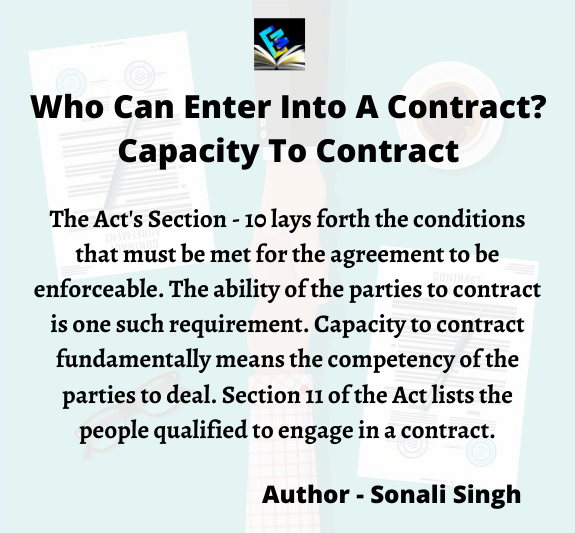
Who Can Enter Into A Contract? | Capacity To Contract
Keyword : Minor, Contract, Estoppel, Tort, Restitution, Beneficial contract, Unsound Mind, English Common Law.
Author: Sonali Singh
Edited By: Sharon Paul
Introduction
A contract is defined under Section 2(h) of the Indian Contracts Act, 1872 as a legally binding arrangement. The Act’s Section – 10 lays forth the conditions that must be met for the agreement to be enforceable. The ability of the parties to contract is one such requirement. Capacity to contract fundamentally means the competency of the parties to deal. Section 11 of the Act lists the people qualified to engage in a contract. Every person of legal age, of sane mind and un-disqualified by the law of which s/he is subject, is qualified.
In a nutshell, minors, those of unsound minds, and people barred by law from contracting are incompetent. The ability to contract is crucial, as its absence renders the agreements null and void.
MINOR
In India, the age of the majority is 18 years. When a guardian is appointed for a minor person and his/her property, the minor must be below 18 years old. Neither Section 10 nor Section 11 specify whether the consequence of the minor’s agreement is null or void. However, a landmark judgement took place in Mohiri Biwi vs. Damodardas Ghosh’s case. The judicial committee decreed that the agreement with juvenile was void due to lack of contractual responsibility on both sides. The council reasoned that a child’s poor judgement could lead to a contract that is harmful to the child’s interests. As a result, declaring the minor’s agreement void may be the best option for him.
Effects Of Minors’ Contracts
a. No estoppel against a minor:
A minor is not barred from raising the defence of infancy. The objective of contract law is to protect minors from contractual liability. Therefore, the doctrine of estoppel, of course, cannot be used to oppose that policy.
b. No tort liability stemming from the contract:
Because of his inability to grant permission, a minor’s agreement has no legal consequences. As a result, a minor cannot be held liable for that is construed as indirect means of enforcing his agreement. As a result, if a tort is closely related to a contract, minor will not be held accountable in tort. This happens because fulfilling the contract would be tantamount to suing a new-born. Burnard versus Haggis (1863) asserted, if the tort is unrelated, the minor is not absolved by involvement of a contract.
c. The doctrine of restitution
The doctrine of restitution was first established in the case of Leslie vs. Shell. Here, an infant deceived money lenders by lying about his age and borrowed 400 euros claiming to be an adult. Decision entailed that only goods/property (not cash) could be returned, obtained by deceiving, if any found in his possession. Because the lawsuit included money, the plaintiff’s attempt to recover money from the child was unsuccessful.
The Chief Justice extended the above principle to monetary matters in the case of Khan Gul vs. Lakha Singh. The defendant, a minor, fraudulently concealed his age, contracted to sell land. After taking an amount of Rs. 17500 from the plaintiff, refused to perform his part of the obligation. The Chief Justice held the minor liable to refund the consideration. Finally, the Law Commission of India included the notion of restitution in Specific Relief Act 1963 by adopting Section 33. This states that minors may be asked to restore the benefits gained during the contract to the degree they benefited.
- Beneficial Contract: A contract is made for the advantage of a minor and the he/she bears no obligations towards contracts. Therefore, the minor may enforce the contract as long as suitable to his/her interests. Minors have the right to seek restitution. For example: a contract for marriage, apprenticeship, etc.
It is to be noted, that a minor cannot ratify an agreement made in his minor years, when he reaches
A Person with an Unsound Mind
The idea of a sound mind to contract is defined in Section 12 of the Act. A person capable of understanding and making logical decisions regarding the contract, is considered as a person of sound mind. Person of usually sound and occasionally unsound mind (and vice versa), shall not engage in a contract if unsound at that time.
We can use the example of a patient in a mental institution to better grasp the above proposition. Similarly, a drunk person unable to make reasonable decisions or comprehend the contract is incapable of contracting until inebriation subsides. In Indian Law (unlike English law, where such agreements are voidable), agreements with mentally ill people are void.
Conclusion
While Indian Contract Law originates from English Law, the interpretations and positions of both differ on various points, as highlighted. Precisely, English law is clearer, for interpretations are codified and grey areas are not to be filled by judicial decisions.
Finally, the English Common Law demonstrates a broader scope by dealing with unsoundness under incapacity. This covers public corporations, minorities, and those who are inebriated or mentally ill.
For More information visit us
Or mail us at edumoundofficial@gmail.com






